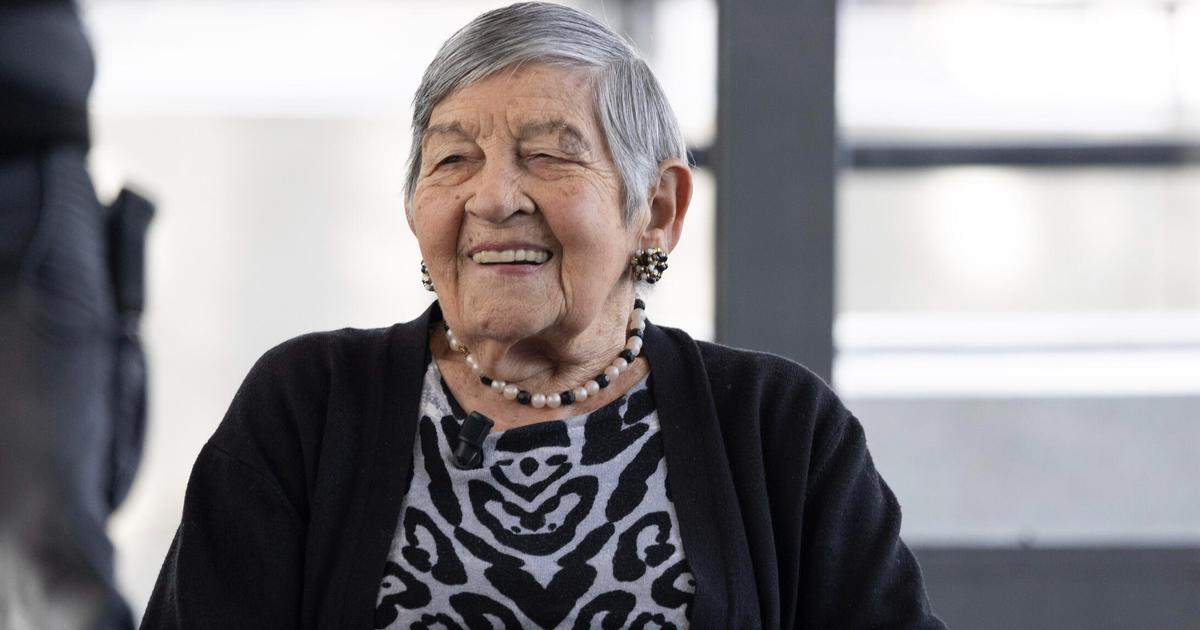Enlarge image
Holocaust survivor Emil Farkas: His mother called out to him - “Hold on!
Be strong!
We'll meet Again!"
Photo: ANNEGRET HILSE / REUTERS
Emil Farkas still remembers exactly how he and his older brother David were crammed into a wagon in 1942.
In the distance he heard his mother shouting: “Hold on!
Be strong!
See you again! «Emil Farkas was 13 years old when he was deported from his hometown of Zilina in Slovakia.
Just because he's a Jew.
In December 1944, the two boys were sent to the Sachsenhausen concentration camp.
Josef S. had been serving there since January 1942.
He often kept watch on one of the towers of the camp, he belonged to the SS Totenkopf Guard Battalion and was a member of six different companies of the guard teams before he was promoted to SS Rottenführer.
Senior Public Prosecutor Cyrill Klement has charged Josef S. with complicity in murder in 3518 cases.
Tens of thousands died in Sachsenhausen concentration camp.
They starved to death, froze to death, worked their way to death, died from abuse, medical experiments or systematic killings.
The 100-year-old Josef S. has to answer before the Neuruppin district court.
He is ready to comment, but not on the specific allegations.
50 years of silence
On this rainy Thursday - more than 75 years later - Emil Farkas and Josef S. meet: the Holocaust survivor in a dark blue suit, pink shirt and tie and the former security guard in a colorful knitted sweater with headphones in thick, white hair.
You are sitting in the gym of the Brandenburg an der Havel correctional facility, which had the court converted into a hearing room so that S., who lives only a few minutes' drive away, has a short journey.
S. lives alone and largely independently, he will be 101 years old in November and is likely to be the oldest defendant in a Nazi trial.
S. enters the hall with the help of a rollator, a plaster on his head reminds of an operation last week.
'Did you get through everything well?
Does anything still hurt? «Asks the presiding judge Udo Lechtermann.
"The doctors did it very well," replies S.
more on the subject
Survivors in the process of the concentration camp guard: "For me, Mr. S. was an accomplice in this death machine" By Julia Jüttner, Brandenburg an der Havel
Trial of 100-year-old concentration camp guard: mass murder "with the help of the accused" Julia Jüttner reports from Brandenburg an der Havel
It is a trial of international concern with co-plaintiffs from Israel, France, the Netherlands, Poland, Germany and Peru. There are women and men who were imprisoned in the camp themselves or relatives of inmates who were murdered there. Emil Farkas will be the only survivor from Sachsenhausen to appear as a witness in these proceedings. He says he has never described what he has experienced before a German court. It took him 50 years to even be able to talk about it.
Emil Farkas, born in 1929, has lived in Israel since its liberation.
He worked there as a physical education teacher for 40 years.
He came to Germany from Haifa on Monday with his granddaughter and her husband.
He was "emotionally very excited", "the encounters and impressions" were very stressful for him, says his lawyer Thomas Walther.
Emil Farkas takes a seat in the middle of the courtroom, his granddaughter's husband on his right and an interpreter on his left.
Hebrew has become Farkas' everyday language since he moved to Israel.
"A little piece of freedom"
The granddaughter's husband first gives a declaration in Hebrew in Farkas' name. In it he describes how the mother called out to her two younger sons: “Hold on! Be strong! We'll see you again! «Emil Farkas himself says that he has never forgotten these words. They gave him the strength to endure what came after his separation from his mother.
Emil Farkas remembers how he and his brother were brought from the Szered concentration camp to Oranienburg in 1944 and driven from the train station there to the camp.
He saw the writing above the entrance gate: "Work makes you free".
It was December, freezing cold.
They were given blue and white striped pajamas, wooden sandals and their heads shaved.
At the roll call square, ten hanged people were hanging on the bar of a football goal, says Farkas.
If they didn't parry, the SS officers would have threatened them: "Then we'll take you there!" The inmates' names were replaced by numbers from Emil Farkas: 1195112.
Josef S. follows the descriptions of the former concentration camp inmate.
He rocks his upper body slightly back and forth.
The interpreter is crying
Emil Farkas reports how he had to remove insulation rubbers from old cables for the Siemens company, how he got up around five in the morning, washed and exercised in the snow, even though he was completely malnourished.
"That was a little bit of freedom for me." The SS men watched him and sent him to the notorious "Shoe Runner Command", a punishment company where prisoners had to test shoes on a test track for the Wehrmacht from 1943 onwards.
Every day he had to march 40 kilometers and "break in" new Wehrmacht boots, from 6 a.m. to 5 p.m. over a distance of 700 meters.
Not all of them would have survived, Farkas recalls, he speaks of »death marches«.
They walked through mud and sand, over concrete and cobblestones and had to sing the second verse of the "Erika" song, says Emil Farkas.
He still knows the melody and all of a sudden he starts singing in German: "A little girl lives back home and that is Erika."
Emil Farkas pauses briefly and turns to Josef S .: "You are 100 times older than little Erika." Farkas means his own niece, who was deported to Auschwitz in 1942 with his two oldest brothers, his sister and her husband.
The interpreter's voice breaks, he cries.
"Be brave, at least now"
Three young people his age voluntarily jumped into the electrically charged fence "to get rid of hunger," reports Emil Farkas.
Then his mother's words came back to his mind: “Hold on!
Be strong!
We'll meet Again!"
In the end, Emil Farkas turned to Josef S directly: »My mother's sentences came true.
The Nazi regime, which you, Mr S., voluntarily and willingly supported, was not strong enough to defeat my mother.
I found her, my father and my brother in Prague. "
Emil Farkas is convinced that sport kept him alive.
“He saved my life in the hell that you, Mr. S., guarded.
I am sure that you saw me at the test track back then.
I came to see you from Haifa and asked you: You are 100 years old.
Is your dark secret worth so much that you cannot apologize for your contribution to my suffering?
Be brave, at least now. "
Judge Lechtermann looks at the defendant.
"Mr. S., would you like to say something else?" Josef S. shakes his head.
"Not for the time being."













